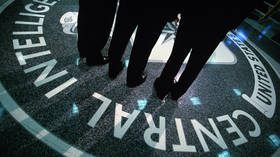Why the CIA cannot be trusted and violates what the US should stand for — RT World News

The CIA essentially sets its own rules over what data it collects, and politicians know it. Here’s how it is allowed to do so
The recent efforts by two US Senators to get more transparency over intelligence harvesting by the Central Intelligence Agency, which involves the “incidental” collection of US citizens’ personal information, opens the door to an Orwellian universe of doublespeak that threatens the very fabric of American democracy.
The whole scenario reminds me of a famous scene in the movie ‘Casablanca’. Captain Louis Renault, a French police officer in Nazi-occupied French Morocco, is instructed to shut down ‘Rick’s Café Americain’, operated by an American expatriate, Rick Blaine. The pretext used is the “discovery” by Renault that Rick is running an illegal casino. “I’m shocked, shocked to find that gambling is going on in here!” Renault exclaims. The croupier then hands him a wad of cash, telling Renault, “Your winnings, sir.” Renault pockets the money, replying “Oh, thank you very much.”
On February 10, Senators Ron Wyden (D-Oregon), and Martin Heinrich (D-New Mexico), both of whom are members of the Senate Select Committee on Intelligence, issued a public statement calling for greater transparency on the part of the CIA regarding a secret bulk collection program operated under the auspices of Executive Order 12333. The senators were acting on the declassification of a letter they wrote to CIA Director William Burns and Director of National Intelligence Avril Haines on April 13, last year, in which they called for the declassification of information on this program.
In the letter, Wyden and Heinrich expressed shock at the existence of this program, which, they claimed, “operated entirely outside the statutory framework that Congress and the public believe govern this collection, and without any … judicial, congressional or even executive oversight.” In short, Wyden and Heinrich have accused the CIA of conducting a rogue operation outside the framework of law and oversight that politicians have ostensibly demanded of intelligence operations.
While the specific activities Wyden and Heinrich are concerned with have been redacted from the letter, the CIA, by releasing a tranche of declassified documents in response to the senators’ request, has provided significant clues as to what the data collected consists of: “Information storage media, raw intercepts, personal property, or information derived therefrom” have been provided to the CIA by “entities of cooperating foreign governments.”
As the CIA points out in these documents, human intelligence collection has been a mission assigned to the agency under Executive Order (EO) 12333, originally promulgated under President Ronald Reagan in 1981, but recently updated under Barack Obama. Indeed, Section 309 of the Intelligence Authorization Act of 2015 details the “procedures for the retention of incidentally acquired communication” under EO 12333.
Wyden was elected senator in 1996 and has served on the select committee since early 2001. Heinrich was elected senator in 2013; he was assigned to the committee that same year. Both voted against the 2015 Intelligence Authorization Act, citing concerns over the reach of the collection of communications and the lack of safeguards in place to protect the constitutional rights of Americans caught up in such activity. In short, both were aware not only of EO 12333, but also the specific legislation which made such collection legally possible. Their collective outrage today has the same credibility as Captain Renault’s shock at the existence of gambling in Rick’s Café.
The fact of the matter, though, is that, as members of the select committee, both are severely constrained about the level of detail that can be shared with the US public about intelligence programs, even those they oppose. However, Wyden’s heart is in the right place – that much was evident in his treatment of former Director of National Intelligence James Clapper during questioning in March 2013. Then, Wyden asked Clapper if the NSA collects “any type of data at all on millions of Americans.”
“No, sir,” Clapper replied. “There are cases where they could inadvertently perhaps collect, but not wittingly.”
Wyden had just caught Clapper in a lie, given under oath, before the US Congress, ostensibly a serious crime. But Wyden could not expose the lie at that time, due to the classification of the programs in question. Only after Edward Snowden released over a million pages of highly classified intelligence reports detailing the existence of some of the very intelligence programs Clapper had denied were in place was he compelled to admit he had lied – sort of.
In a June 2013 appearance on MSNBC, Clapper said there simply was no straightforward answer to Wyden’s question. “I thought, though in retrospect, I was asked – ‘When are you going to start – stop beating your wife’ kind of question, which is meaning not – answerable necessarily by a simple yes or no. So, I responded in what I thought was the most truthful, or least untruthful, manner by saying ‘No’.”
In a letter to the chairperson of the select committee, Senator Dianne Feinstein (D-California), Clapper modified his confession, denying he had deliberately lied to Congress, but rather that he “simply just didn’t understand the question” he was asked, claiming he was focused on intelligence collection under Section 702 of the Foreign Intelligence Surveillance Act, while Wyden’s question was about Section 215 of the Patriot Act. Wyden threw cold water on this excuse, however, stating publicly that he had shared the question with Clapper ahead of time, and that he knew exactly what was being asked of him.
James Clapper needs to stop making excuses for lying to the American people about mass surveillance. To be clear: I sent him the question in advance. I asked him to correct the record afterward. He chose to let the lie stand. https://t.co/i6jls7I9Em
— Ron Wyden (@RonWyden) March 6, 2019
Nowhere in this exchange, however, were the collection programs conducted under EO 21333 discussed; neither Wyden nor Clapper made any reference to this program. And yet, as documents published by the American Civil Liberties Union (ACLU) in 2014 highlight, both knew that the bulk of the data collected by the US intelligence community which contained information on US citizens was done so under EO 21333. “The NSA conducts the majority of its SIGINT activities solely pursuant to the authority provided by Executive Order (EO) 21333,” one document noted. Another declared that EO 12333 “is the primary source of [the] NSA’s foreign intelligence gathering authority.”
The failure of either Wyden or Clapper to refer to EO 12333 cannot be explained away simply by saying that the issue was unknown to either of them. Indeed, the controversy surrounding EO 12333 and the potential it created for the CIA to spy on US citizens was a matter of public debate shortly after the order was issued back in 1981. A 1985 article in the June 5, 1985 issue of the Cornell Law Review, entitled ‘Executive Order 12333: Unleashing the CIA violates the Leash Law’, declared that “[t]he Order allows the CIA … to direct domestic counterintelligence, foreign intelligence, covert operations, and law enforcement activity against United States citizens,” and argued that it should be rescinded immediately.
Back in 1985, no one could have imagined the level to which digital communications would come to dominate every aspect of the lives of not only US citizens, but virtually every person in the world who owns a smartphone. The fact that the CIA conducts intelligence sharing relationships with agencies of foreign governments should come as a surprise to no one – that’s its mission. Neither should the fact that the CIA has relationships which result in vast amounts of digital communications transferred from these agencies to it for follow-on analysis. Again, this is its job.
What should disturb – even disgust – every American is that the CIA is using these activities, all of which are conducted under the authority of EO 12333, as a ‘backdoor’ for US law enforcement to collect information on American citizens that it would otherwise be prohibited from doing so because of constitutional constraint. The CIA, of course, argues otherwise. In documents released in 2017, its Office of Privacy and Civil Liberties declared that “The CIA complies with Executive Order 12333’s prohibition against conducting electronic surveillance in the United States, but may in the course of its authorized intelligence activities acquire electronic communications through other means.”
This references the “incidentally” acquired “information storage media, raw intercepts, personal property, or information derived therefrom” the CIA receives from its foreign collaborators.
The CIA then goes on to detail how its “collection, retention, and dissemination of information concerning United States persons” conforms with both the law and restrictions put in place by the attorney general.
The problem is that, in the Orwellian universe of US intelligence, words like “collection” and “retention” mean something very different to the practitioners than they do to the average American citizen. James Clapper alluded to this in his June 2013 MSNBC interview when he noted that, when it came to the issue of “intelligence collection,” “[w]hat I was thinking of is looking at the Dewey Decimal numbers – of those books in that metaphorical library – to me, collection of US persons’ data would mean taking the book off the shelf and opening it up and reading it.”
Clapper, like all US intelligence personnel, has been trained to operate in a world where “it is necessary to stop first and adjust your vocabulary,” as a US intelligence training guide notes. “The terms and words used in [regulations] have very specific meanings, and it is often the case that one can be led astray by relying on the generic or commonly understood definition of a particular word.
“For example, the ‘collection of information’ is defined in the Dictionary of the United States Army Terms as: ‘The process of gathering information for all available sources and agencies’. But, for the purposes of [the regulations], information is ‘collected’… only when it has been received for use by an employee of a DoD intelligence component in the course of his official duties … (and) an employee takes some affirmative action that demonstrates an intent to use or retain the information … [t]herefore, mere receipt of non-essential information does not constitute a violation of [regulations].”
As such, the CIA defines itself as not “collecting” intelligence when it receives data on US citizens from foreign intelligence agencies. It only “collects” intelligence when this data is accessed by a CIA analyst.
Likewise, the term “retention” means more than merely retaining information in files: “[I]t is retention plus retrievability.” As per the regulation, “the term retention as used in this procedure, refers only to the maintenance of information about United States persons which can be retrieved by reference to the person’s name or other identifying data.”
In short, the CIA can “collect” and “retain” information on US citizens if it does not access the data in question using search queries involving names, social security numbers, telephone numbers, or other identifying data.
This isn’t simply a matter of ‘inside baseball’, playing semantic games with various legal authorities and definitions. There are real-world implications involving the fundamental issue of how “rule of law” functions in a democracy. “There’s a key difference,” the ACLU warned in 2014, “between EO 12333 and the two main legal authorities that have been the focus of the public debate – Section 215 of the Patriot Act and the FISA Amendments Act, which the government relies on to justify the bulk collection of Americans’ phone records and the PRISM program. Because the executive branch issued and now implements the executive order all on its own, the programs operating under the order are subject to essentially no oversight from Congress or the courts.”
Read those words again. “No oversight from Congress or the courts.” Essentially, US citizens are expected to trust the CIA to restrain its operations on its own volition. No one would, or should, accept such terms, especially from an organization such as the CIA with a proven track record of dissembling when it comes to telling the truth (as former CIA Director Mike Pompeo noted, in April 2019: “I was the CIA director. We lied, we cheated, we stole. We had entire training courses. It reminds you of the glory of the American experiment”).
Ronald Reagan famously made use of a Russian proverb, “Trust, but verify,” when speaking of the necessity of adequate verification measures when it came to arms control. If that standard was good enough for the Soviet Union, then it should be good enough for the CIA. Otherwise, we will continue to live in a world where our elected officials continue to be shocked to discover that there is gambling taking place in Rick’s Café, all the while pocketing the profits of such illicit activity.
The statements, views and opinions expressed in this column are solely those of the author and do not necessarily represent those of RT.




